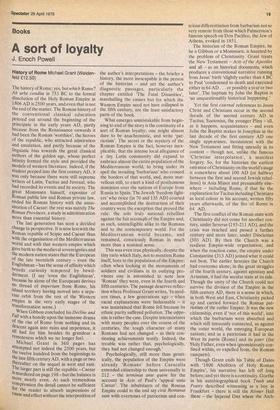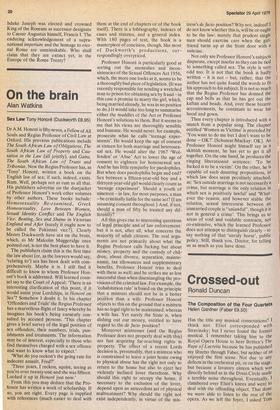Books
A sort of loyalty
J. Enoch Powell
• History of Rome Michael Grant (Weidenfeld £12.50) The history of Rome; yes, but which Rome? Ab urbe condita in 753 BC to the formal dissolution of the Holy Roman Empire in 1806 AD is 2500 years, and even that is not the end of the matter. The Roman history of the conventional classical education Petered out around the beginning of the principate in the early years AD, partly because from the Renaissance onwards it had been the Roman 'worthies', the heroes of the republic, who attracted admiration and emulation, and partly because of the linguistic bias towards the great classical authors of the golden age, whose perfect latinity formed the style and provided the models of western literature. Indeed, if the student peeped into the first century AD, it was only because there were still supreme Writers of Latin, Tacitus and Juvenal, who had recorded its events and its society. The great Mommsen himself, expositor of Roman public law and Roman private law, ended his Roman history with the assassination of Caesar: the rest was merely The Roman Provinces, a study in administration more than essential history.
The last generation has seen a decided change in perspective. It is now less with the Roman republic of Scipio and Caesar than With the organisation of the Mediterranean world and with that western empire which gave birth to the medieval sovereignties and the modern nation states that the European of the late twentieth century — even the Englishman —has the sense of affinity which breeds curiosity tempered by bewilderment. (I say 'even the Englishman', because he alone of the Europeans derives n. 0 thread of imperium from Rome, his Island territory having moved into a separate orbit from the rest of the Western empire in the very early stages of the transformation scene.) When Gibbon concluded his Decline and Pall with a homily upon the immense drama of the rise of Rome from nothing and its descent again into ruins and impotence, it all had for him besides its grandeur a remoteness which we no longer feel. Michael Grant in 360 pages has attempted not indeed the 2500 years, but the twelve hundred from the beginnings to the late fifth century AD, with a page or two thereafter on the sequel in west and east. The larger part is still the republic —Caesar tamurdered on page 198 —but the balance is more nearly even. At such tremendous compression the detail cannot be sufficient for the reader to absorb impressions of cause and effect without the interposition of
the author's interpretations — the briefer a history, the more inescapable is the person of the historian — and yet the author's diagnostic passages, particularly the chapter entitled 'The Fatal Disunities', marshalling the causes but for which the Western Empire need not have collapsed in the fifth century, are the least satisfactory parts of the book.
What emerges unmistakable from beginning to end of the story is the continuity of a sort of Roman loyalty; one might almost dare to be anachronistic, and write 'patriotism'. The secret or the mystery of the Roman Empire is the fact, however inexplicable, that the intense local allegiance of a tiny Latin community did expand to embrace almost the entire population of the Mediterranean world, to bring under its spell the invading 'barbarians' who crossed the borders of that world, and, more marvellous still, to exert a kind of posthumous dominion over the nations of Europe from Russia to Spain. The Jewish 'freedom fighters' who twice (in 70 and 135 AD) courted and accomplished the destruction of their country were the exception that proved the rule: the sole truly national rebellion against the fait accompli of the Empire and, as such, unintelligible alike to the Romans and to the contemporary world. For the Mediterranean world became, and remained, consciously Roman in much more than a nominal sense.
This was even true physically, despite the tiny ratio which Italy, not to mention Rome itself, bore to the population of the Empire: often when looking at the monuments of soldiers and civilians in its outlying provinces one is astonished to note how 'Roman' they were, even in the fourth and fifth centuries. The passage deserves reflection where Professor Grant writes, 'In modern times, a few generations ago — when racial explanations were fashionable — it was maintained that Rome fell because its ethnic purity suffered pollution. The opposite is rather the case. Despite intermixtures with many peoples over the course of the centuries, the tough character of many Romans had not changed — as their continuing achievements testify. Indeed, the trouble was rather that, psychologically, they had not changed enough.'
Psychologically, still more than genetically, the population of the Empire were already 'Romans' before Caracalla extended citizenship to them universally in 212 — the terminus ante quem for the account in Acts of Paul's 'appeal unto Caesar'. The inhabitants of the Roman Empire could to the end say civic Romanus sum with overtones of patriotism and con
scious differentiation from barbarism not so very remote from those which Palmerston's famous speech on Don Pacifico, the Jew of Athens, evoked in 1851.
The historian of the Roman Empire, be he a Gibbon or a Mommsen, is haunted by the problem of Christianity. Grant treats the New Testament — Acts of the Apostles and all — as an historical documents, which produces a conventional narrative running from Jesus' birth 'slightly earlier than 4 BC to Paul 'condemned to death and executed either in 64 AD. . . or possibly a year or two later'. The baptism by John the Baptist is 'an unquestionably historical happening.'
Yet the first external references to Jesus Christ and Christians occur in the second decade of the second century AD in Tacitus, Suetonius, the younger Pliny — all, as it happens, acquaintances — and even
John the Baptist makes in Josephus in the last decade of the first century AD one single appearance, inconsistent with the New Testament and fitting uneasily in its context — though not, unlike the famous 'Christian interpolation', a manifest forgery. So, for the historian the earliest entrance of Christianity on the world's stage is somewhere about 100 AD (or halfway between the first and second Jewish rebellions) in Asia Minor and presumably elsewhere — including Rome, if that be the explanation for Tacitus including Christians as local colour in his account, written fifty years afterwards, of the fire of Rome in 64 AD.
The first conflict of the Roman state with Christianity did not come for another century, under Severus (193-211 AD), and the crisis was reached and passed a further century and more later, under Diocletian (303 AD). By then the Church was a resilient Empire-wide organisation; and when the reaction came, the empire under Constantine (313 AD) joined what it could not beat. The earlier heresies the Church had overcome alone; in the great struggles of the fourth century, against apostasy and Arianism, it had the secular state at its side. Though the unity of the Church could not survive the division of the Empire in the fifth century AD, there is a sense in which, in both West and East, Christianity picked up and carried forward the Roman patriotism of the earlier Empire. It was the new citizenship, even if 'not of this world', into which the barbarians were absorbed and which still tenuously connected, as against the outer world, the emerging European nations; and as a patriotism it had in the West its patria (Rome) and its pater (the 'Holy Father, even when ignominiously confined within, or expelled from, the Roman ramparts).
Though Grant ends his Table of Dates with '1806 Abolition of Holy Roman Empire', his narrative has left off long before; and yet there is a continuity. Goethe in his autobiographical book Muth and
Poetry described witnessing as a boy in Frankfurt — there is still the Romer Hall there — the Imperial Diet where the Arch hduke Joseph was elected and crowned King of the Romans as successor designate to Caesar Augustus himself, Francis I. The enduring acknowledgement of a supranational imperium and the homage to eternal Rome are unmistakable. Who shall claim that they are extinct yet, in the Europe of the Rome Treaty?



































 Previous page
Previous page